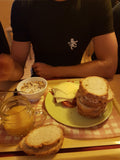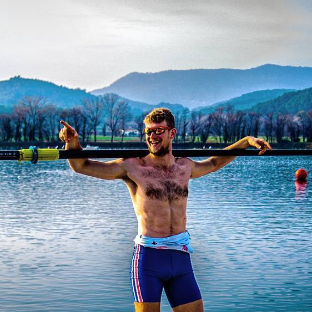For full and part time athletes alike, training camps are where you eat, sleep and breath your sport, friendships are forged and teams and crews are made. Training "camps" are where a team leaves their usual base of training, usually to a foreign venue to train intensively for 10 days, sometimes more. I had never been on one of these camps until I started rowing, but having now been on several I can say that there are a lot of benefits. The biggest one being that teams get to focus completely on their sport; All we have to do on camp is train, eat, and sleep; train, eat, sleep, train, eat, sleep, until we have to travel back home and spread our focuses elsewhere.
For rowing, camp usually means much more mileage. We are used to doing a high volume of training anyway, but when it comes to camp, the amount of training is taken up a notch. On average outside of camp we will row 2-3 times a day, usually one of those sessions is shorter or optional so people can get away to work if they need to. On camp, we do at least three sessions a day, none of them are short. On the week before camp this year we rowed on the water for a total of 160k. At camp however, we rowed 350k, more than double! On top of this we have to fit in other cross training and weights sessions too. That is like going from running 2 half marathons a day to running 2 full marathons a day!
 Doing this day after day really takes its toll on the body, we have to make sure we are fueling our bodies correctly and also recovering to the best of our ability. Since we are doing so much more exercise we have to consume even more food than usual. When the norm is almost 6000 calories a day, on camp it becomes difficult to consume enough! Recovery can include anything from lying in bed with my KYMIRA leggings to a light game of pool; all we are doing is trying not to consume too much energy before the next session.
Doing this day after day really takes its toll on the body, we have to make sure we are fueling our bodies correctly and also recovering to the best of our ability. Since we are doing so much more exercise we have to consume even more food than usual. When the norm is almost 6000 calories a day, on camp it becomes difficult to consume enough! Recovery can include anything from lying in bed with my KYMIRA leggings to a light game of pool; all we are doing is trying not to consume too much energy before the next session.
 All of us have different things we do to pass the time in between sessions. Another great thing about camp is that we can train at any time of day, there are no outside distractions. Training at all times of the day means bigger gaps between sessions, which means we have to occupy our time, but not use too much energy! I like to take photographs, sometimes I edit some videos, some people bring board games to play (this can become very energy consuming since we are all so competitive!), some people manage to do some work remotely so they do not lose touch, there are even some who take classes online during camp… and lastly others take naps, lots of naps. All of these options are very individual and can vary day to day, mostly depending on how hard the training has been so far and how much energy you have.
All of us have different things we do to pass the time in between sessions. Another great thing about camp is that we can train at any time of day, there are no outside distractions. Training at all times of the day means bigger gaps between sessions, which means we have to occupy our time, but not use too much energy! I like to take photographs, sometimes I edit some videos, some people bring board games to play (this can become very energy consuming since we are all so competitive!), some people manage to do some work remotely so they do not lose touch, there are even some who take classes online during camp… and lastly others take naps, lots of naps. All of these options are very individual and can vary day to day, mostly depending on how hard the training has been so far and how much energy you have.
In a way camp is almost a holiday (obviously your definition may vary!), we get to go to a foreign country (I have been to Spain, France, Florida, Germany and others) where we get to escape the varied weather of England and get some consistently flat water. This gives us the opportunity to consistently push ourselves until we "walk out on our knees" and crawl back to our beds. Above all though, you get out what you put into a training camp. If you go in with a strong mental attitude, a determination to succeed, put in the effort (no matter how much it hurts) then you will return home fitter and stronger than ever before and ready to take on the next challenge!

